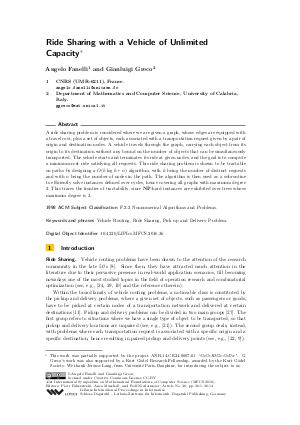Ride Sharing with a Vehicle of Unlimited Capacity
Authors Angelo Fanelli, Greco Gianluigi
-
Part of:
Volume:
41st International Symposium on Mathematical Foundations of Computer Science (MFCS 2016)
Part of: Series: Leibniz International Proceedings in Informatics (LIPIcs)
Part of: Conference: Mathematical Foundations of Computer Science (MFCS) - License:
 Creative Commons Attribution 3.0 Unported license
Creative Commons Attribution 3.0 Unported license
- Publication Date: 2016-08-19
File

PDF
LIPIcs.MFCS.2016.36.pdf
- Filesize: 1.3 MB
- 14 pages
Document Identifiers
Subject Classification
Keywords
- vehicle routing
- ride sharing
- pick up and delivery problem
Metrics
- Access Statistics
-
Total Accesses (updated on a weekly basis)
0Document
0Metadata
Abstract
A ride sharing problem is considered where we are given a graph, whose edges are equipped with a travel cost, plus a set of objects, each associated with a transportation request given by a pair of origin and destination nodes. A vehicle travels through the graph, carrying each object from its origin to its destination without any bound on the number of objects that can be simultaneously transported. The vehicle starts and terminates its ride at given nodes, and the goal is to compute a minimum-cost ride satisfying all requests. This ride sharing problem is shown to be tractable on paths by designing a O(h*log(h)+n) algorithm, with h being the number of distinct requests and with n being the number of nodes in the path. The algorithm is then used as a subroutine to efficiently solve instances defined over cycles, hence covering all graphs with maximum degree 2. This traces the frontier of tractability, since NP-hard instances are exhibited over trees whose maximum degree is 3.
Cite As Get BibTex
Angelo Fanelli and Greco Gianluigi. Ride Sharing with a Vehicle of Unlimited Capacity. In 41st International Symposium on Mathematical Foundations of Computer Science (MFCS 2016). Leibniz International Proceedings in Informatics (LIPIcs), Volume 58, pp. 36:1-36:14, Schloss Dagstuhl – Leibniz-Zentrum für Informatik (2016)
https://doi.org/10.4230/LIPIcs.MFCS.2016.36
BibTex
@InProceedings{fanelli_et_al:LIPIcs.MFCS.2016.36,
author = {Fanelli, Angelo and Gianluigi, Greco},
title = {{Ride Sharing with a Vehicle of Unlimited Capacity}},
booktitle = {41st International Symposium on Mathematical Foundations of Computer Science (MFCS 2016)},
pages = {36:1--36:14},
series = {Leibniz International Proceedings in Informatics (LIPIcs)},
ISBN = {978-3-95977-016-3},
ISSN = {1868-8969},
year = {2016},
volume = {58},
editor = {Faliszewski, Piotr and Muscholl, Anca and Niedermeier, Rolf},
publisher = {Schloss Dagstuhl -- Leibniz-Zentrum f{\"u}r Informatik},
address = {Dagstuhl, Germany},
URL = {https://drops.dagstuhl.de/entities/document/10.4230/LIPIcs.MFCS.2016.36},
URN = {urn:nbn:de:0030-drops-64506},
doi = {10.4230/LIPIcs.MFCS.2016.36},
annote = {Keywords: vehicle routing, ride sharing, pick up and delivery problem}
}
